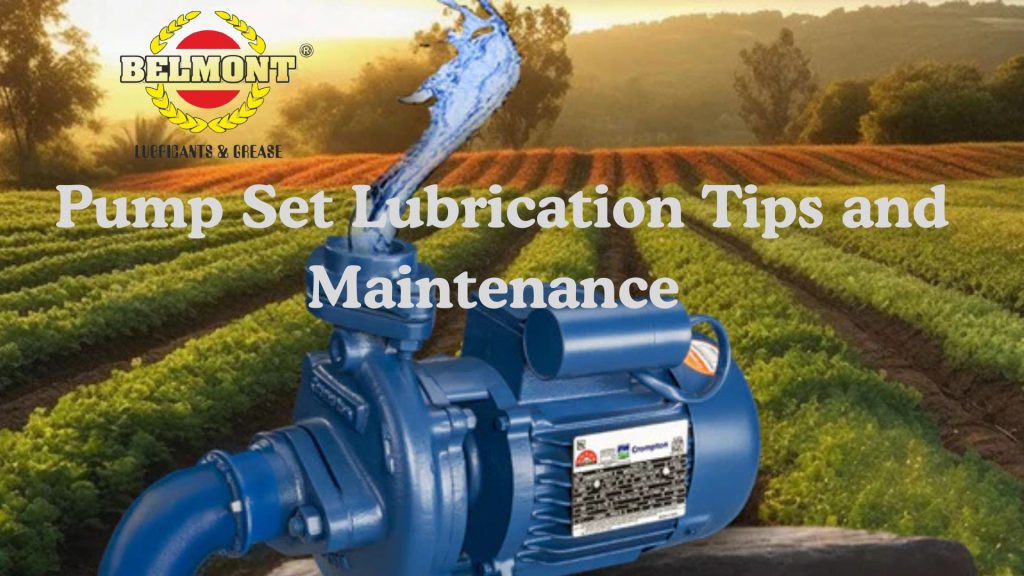
Introduction
Pump sets are essential in both agriculture and industry. From irrigating fields to powering industrial applications, their reliability depends heavily on proper lubrication and regular maintenance. Without the right lubrication, pumps face friction, overheating, and early wear. This blog covers the best pump set lubrication tips and maintenance practices that ensure long life and efficiency.
Belmont, a trusted name in lubricants and greases, provides specialized solutions for pump sets and other industrial machinery. Explore more at www.belmontlubricants.com and www.belmont.in.
Why Pump Set Lubrication is Important
- Reduces friction between moving parts
- Minimizes wear and tear
- Prevents overheating of pump bearings
- Extends overall pump life
- Ensures smooth operation with less downtime
According to Grundfos service instructions, pump bearings should be lubricated at intervals of around 2000 operating hours for optimal performance. Similarly, SKF recommends adequate lubrication to protect rolling bearings and extend service life.
Best Pump Set Lubrication Tips
1. Use the Right Lubricant
Not all oils and greases are suitable for pump sets. For effective pump set lubrication tips and maintenance, always follow manufacturer recommendations. In agricultural pumps, diesel engine oil-based lubricants are commonly used. Belmont offers a wide range of engine oils, gear oils, and greases ideal for pump sets.
2. Maintain Proper Lubrication Intervals
Avoid over-lubrication and under-lubrication. Over-lubrication causes seal damage, while under-lubrication increases wear. Follow a strict maintenance schedule:
- For pumps in dusty/dirty environments → lubricate more frequently
- For standard use → every 2000 hours of operation is ideal
3. Keep the Pump Clean
Lubrication works best when dirt and water are kept away from the pump housing. Always clean fittings and surroundings before applying new grease or oil.
4. Choose Between Synthetic and Mineral Lubricants
A common confusion is whether to use synthetic or mineral oil. Synthetic lubricants last longer, handle higher temperatures, and reduce oxidation. Mineral oils are cost-effective but may need more frequent replacement.
For deeper insights, read:
5. Inspect Seals and Bearings Regularly
Seals prevent lubricant leakage. Cracked or worn seals lead to oil loss, which eventually damages the pump. Regular checks and timely replacement ensure smooth functioning.
6. Avoid Mixing Lubricants
Mixing different grades or brands can reduce efficiency. Always drain out old oil before adding new lubricant.
7. Use High-Quality Oils
Older pump sets may require thicker oils for better protection. This is similar to old cars with high mileage, which also need thicker gear oils. Learn more in:
Pump Set Maintenance Checklist
- Check oil level weekly
- Lubricate as per operating hours
- Clean pump casing and surroundings
- Inspect belts, seals, and bearings
- Replace lubricants on time
- Record maintenance history
Common Mistakes to Avoid
- Overfilling lubrication chamber
- Ignoring signs of overheating
- Using cheap or unsuitable lubricants
- Skipping regular maintenance intervals
Belmont’s Role in Pump Set Lubrication
Belmont provides customized lubricants for automotive and industrial needs, including pump set applications. Their range of engine oils, hydraulic oils, and greases ensures pump sets run efficiently in demanding Indian conditions. Learn more at www.belmontlubricants.com and www.belmont.in.
FAQs on Pump Set Lubrication
Q1. Which oil is best for pump sets?
Diesel engine oils and specific pump set oils are commonly used. Always prefer high-quality lubricants like those from Belmont for long-lasting performance.
Q2. How often should pump sets be lubricated?
On average, every 2000 hours of operation, or earlier if pumps operate in dusty, wet, or high-load environments.
Q3. Can synthetic oil be used in pump sets?
Yes, synthetic oils improve performance, especially in high-temperature or continuous operation conditions.
Q4. What happens if pump sets are not lubricated?
Lack of lubrication leads to increased friction, overheating, bearing failure, and reduced lifespan of the pump.
Q5. Can I use gear oil for pump sets?
Gear oils may be suitable in some applications, but it’s best to follow the manufacturer’s recommendation for optimal performance.
Conclusion
Proper pump set lubrication and maintenance are vital for efficiency, durability, and cost savings. By using the right oils, maintaining regular schedules, and avoiding common mistakes, you can significantly extend the life of your pump set. Belmont’s range of lubricants offers reliable solutions tailored for both industrial and agricultural needs.
Explore Belmont’s full product line:
